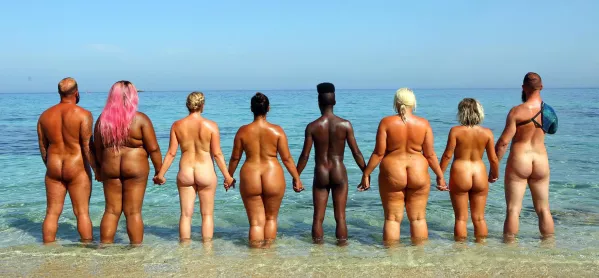- Home
- Naked Beach: Why every family should be watching it
Naked Beach: Why every family should be watching it

As I write, it’s the day after the premiere of Channel 4's Naked Beach, a TV experiment I co-devised with Dr Keon West at Goldsmiths, University of London.
The response has been incredibly positive. While technically a reality TV show focusing on body image, the format is unique in that it doesn’t ask its contributors to change anything other than their perspective. There’s no weight loss or gain, no clothes to flatter the frame, just an immersive experience surrounded by people who inhabit a diverse range of bodies and genuinely love the skin they’re in. These "hosts" also happen to be naked, aside from some beautiful body paint obscuring their genitals.
The (perhaps inevitable) backlash centred around one question: Why was this shown before the watershed? People are naked! My children are watching! The (relatively small murmur) of public outrage was gleefully seized upon by a few press outlets.
I’m glad this happened, because it gives me an opportunity to talk about something I’ve wanted to discuss for a while: Britain has a really messed-up attitude towards nudity and it’s harming our children.
Historically, as a British child, one grows up with conflicting messages in each ear on the subject of nudity. On the one hand, there’s a sort of 1950s, Carry On, seaside postcard, page 3 attitude – an "acceptable", but highly sexualised depiction of human flesh, hidden behind a Benny Hill style cheekiness (and by cheekiness I mean "blatant misogyny"). On the other, we’re a nation of ridiculous prudes. Most of us rarely saw our parents naked as children, heard people wearing skimpy outfits relentlessly slut-shamed and remember vividly the not-so-distant past when if a mother breastfed their baby in public, it made the national papers.
The internet has, as ever, changed the game. Research shows that half of 12-year-olds have been exposed to online pornography. This leaps to 97 per cent by the time they reach 16. Furthermore, social media sites like Instagram appear to have adopted a British-type policy on nudity, on the one hand allowing influencers with millions of followers to post highly photoshopped pictures of themselves wearing nothing but a G-string and sucking on a weight-loss lollipop, but deleting pictures body positive activists post of their stretch marks.
Evidence shows all of this is having an impact on what young people perceive as normal. Last year, Teen Vogue reported on a new trend identified by plastic surgeons, whereby increasing numbers of young people were requesting plastic surgery to more closely resemble the filtered selfies they posted online. Research conducted by charities delivering sex and relationship education lessons revealed young heterosexual men were increasingly having their ideas of what a naked woman should look like (hairless, blemish-free) defined by porn. This might explain why between 2015 and 16, more than 200 girls had labiaplasty – a procedure to trim and reshape their genitals – on the NHS. The BBC discovered girls as young as 9 had requested it.
Boys and men are no longer as immune as they once were to crises of body confidence. In fact, just this week actor Richard Madden expressed concern over the demands placed on him to achieve a highly sculpted ideal for roles – which involves him making bi-daily gym visits and severely restricting his food intake – and the impact that was having on the way men view their bodies in the post-Poldark era.
In the context of all this, it’s time something came along to challenge our culture’s increasingly skewed ideas of normal. To tell people it’s just a body, we all have one under our clothes. It doesn’t have to be about some warped idea of what's sexy. To speak for all the people too ashamed to socialise, or go swimming, or participate in PE at school, because they think their bodies are unacceptable. To showcase the glorious diversity of the human body and to state proudly that we aren’t all meant to look the same.
So, the answer to why Naked Beach is on at 8pm? It’s because it’s a family show. We want parents and carers to sit down with their children to watch and for teachers to take clips into their classrooms. The programme is designed to provoke a much-needed discussion about why Britain has some of the lowest body image satisfaction scores in the world and how that impacts our mental health and happiness – In the knowledge that if we don’t step in to have that conversation, there are millions of influencers and porn sites who will shape a generation’s attitudes in our absence.
The next episode of Naked Beach airs at 8pm on Thursday 18 April, Channel 4.
Natasha Devon MBE is the former government mental health champion. She is a writer and campaigner and visits an average of three schools per week all over the UK
Keep reading for just £1 per month
You've reached your limit of free articles this month. Subscribe for £1 per month for three months and get:
- Unlimited access to all Tes magazine content
- Exclusive subscriber-only stories
- Award-winning email newsletters

